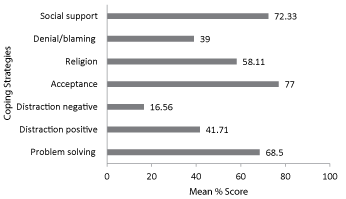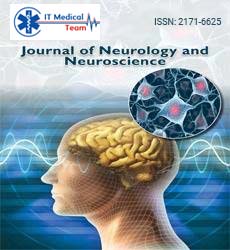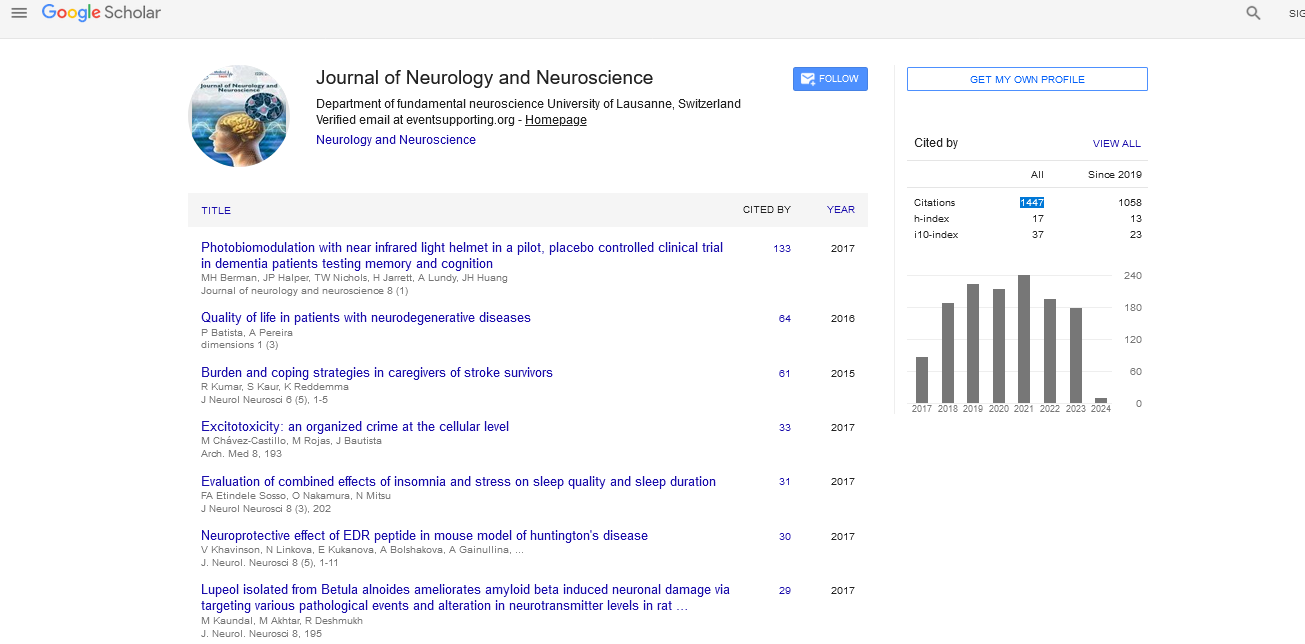| Burden; Coping; Stroke; Caregiver |
Introduction
|
| Caregiver burden refers to the negative feelings and subsequent strain experienced as a result of caring for a chronically sick person [1]. Stroke, one of the public health concerns, is a leading cause of long term disability. Comprehensive stroke care or holistic cares need the very effective caregivers; the caregivers play an important role for post stroke rehabilitation. Additionally, hospitalization exerts a burden on caregivers of patient as well. Caregivers of patient with neurological disease have been found to have higher risk of social isolation, emotional burden and a reduction in quality of life [2-4]. Burden of care of stroke patients impacts the physical as well as psychological wellbeing of the caregiver adversely [5-9]. Hence caregiver burden, particularly that of closely involved family members such as parents, spouse, is important as an outcome measure in mental health care, so as to assess and reduce it for the well-being of both the survivors and caregivers. Indeed, the measurement of caregiver burden has been shown to enhance worker and administrator awareness of the need to reduce such burden in health care field in general [10]. |
| When individual face a traumatic events, they must use a variety of strategies to cope with negative experience and stress. One of the most popular models for coping with stress is given by Lazarus and Folkman [11], which used in the field of stress caused by something life threatening. Lazarus and Folkman have defined coping with stress as an attempt to manage the demand of external and internal environment that are deemed to exceed the subject’s normal request. The model suggests that coping with stress is a process and not a single event. Although there is some disagreement about how coping strategies may be categorized, coping may be classified in to three broad types, i.e. task focused, emotion focused and problem oriented or avoidance focused. Task focused coping seeks to actively perform a task that will remove the problem or make the problem better. Emotion focused coping seeks to regulate distressing emotions and can include emotional expressions, fantasizing, and reflecting on positive or negative thoughts. Avoidance focused coping involves avoiding the adverse situation, and includes social diversion. Taylor [12] emphasizes that although both strategies may be used in all stressful situation, the attempts to solve the problems are especially useful to control stressors, while the attempts to regulate emotions are useful to manage the impact of uncontrollable stressors. |
| As far as role of coping strategies in caregivers is concerned, some studies have highlighted the role of effective coping in reinforcing cohesion and improving relationships within family context. Other studies have pointed out negative impact of caregiving on health status and psychologic conditions [13]. It is essential to understand the extent of burden and usual coping strategies adopted by caregivers of stroke survivors for strategic home rehabilitation and smoothen day to day functioning of caregivers. Thus, the present study aimed to assess the burden and coping strategies among caregivers and find the relationship between burden and coping. |
Material and Methods
|
| The study was conducted in the month of January–May 2014 at conveniently selected community settings of district Amritsar, Punjab. The study population comprised of 100 caregivers of survivors of stroke. Inclusion criteria included healthy caregivers aged more than 18 years or more, staying with patient and are involved in the direct care of the patient for at least one month after getting discharge from the hospital. The caregivers, who refused to participate in the study and having chronic psychiatric and medical conditions, were excluded from the study. The caregivers who were coming for follow up along with the patient at outpatient department were interviewed in the hospital. Others were contacted in their home care settings only. Finally, 43 caregivers were interviewed at hospital and remaining 57 caregivers were at their home settings. The tools used for the study were Information Data Sheet, Zarit Burden Interview Schedule (ZBIS), and Coping Checklist (CCL). The permissions for using tools were sought from each concerned authority. |
Zarit Burden Interview Schedule (ZBIS)
|
| It is designed by Steven H Zarit [14]. (USA), to reflect the stresses experienced by caregivers of disabled patients. It is 5 point rating scale ranging from never (0), rarely (1), sometimes (2), quite frequently (3), or nearly always (4). The burden score was categorized in four category;.no burden (0-21), mild to moderate burden (22-40), moderate to severe burden (41-60) and severe burden (61-80). Getting high score in a particular domain indicates higher burden. The calculated value of Cronbach alpha was 0.92 for the current study. |
The Coping Checklist (CCL)
|
| The coping checklist (CCL) of Rao, Subbakrishna and Prabhu [15] was used in the study. It is a comprehensive list of 70 items which has been grouped under 3 broad categories: problem focused (problem solving 10 items), emotion focused (distraction positive 14 items, distraction negative 9 items, acceptance 11 items, religion/faith 9 items, denial/blame 11 items, and problem and emotion focused (social support 6 items). |
| Items are scored dichotomously (Yes/No) pinpointing greater use of that particular coping strategy. The validity of the scale was established through experts’ opinions in the field of nursing and psychiatry. The test re-tests reliability calculated on 10 subjects and came out 0.71 for the study. |
Ethical Consideration
|
| The permission for data collection was obtained from the competent authorities in the Institutes. After screening the subjects as per the inclusion and exclusion criteria, an informed written consent was obtained from them. After filling the demographic profile sheet, the caregivers were interviewed using ZBI to assess the extent of burden experienced by them due to patient’s illness, and CCL to identify the type of coping strategies used by them to undertake burden. In the hospital, the caregivers were interviewed in a separate room in outpatient department at Sri Guru Ram Das Charitable hospital, Vallah, Amritsar, Christian Medical College Hospital, Ludhiana Punjab and Govt. Medical College Amritsar, Punjab. At home setting, caregivers were asked to sit at a comfortable place like rest room, which was chosen far away from the patient to obtain unbiased findings. |
| It took around 1-1.5 hours to conduct one interview. Anonymity and confidentiality of the subjects was maintained during the study and they were given full autonomy to withdraw from the study at any time. The data was then transferred into SPSS 20.0 Evaluation Version and was analyzed using descriptive and inferential statistics. |
Results
|
| The mean age of caregivers was 41.79 years (SD ± 14.12, range 21-79). It was observed that 55% were males, studied up to secondary education (56%), and higher secondary education (27%) and were married (86%). In term of employment status, around 37% of caregivers were housewife followed by 21% working in private sector, and 7% in government sector and earning more than Rs.10,000 per month (71%). Majority of caregivers have their own (98%) accommodation and staying in joint family (56%) with five or more than 5 members (71%) in the family. |
| In term of caregiving, 30% caregivers were son, followed by 25% wife and 12% were as daughter in law, providing care round the clock (58%) with duration of 2.68 ± 1.89 months. 94% of caregivers reported presence of sub-caregiver at home to take care of patient and were found healthy (85%). |
| Data also reveals that 37% of the caregivers were primary earning member in family and helps (94%) in activity of basic daily living (ADLs). About, 8% of the caregivers reported past family history of stroke and approximately 19% mentioned experience of caregiving in the past. However, majority of caregivers (86%) agreed for availability of family support in the care of their patients. |
Extent of Burden
|
| Table 1 summarizes the extent of burden perceived by the caregivers of stroke survivors. It revealed that mean burden score was 28.36 ± 10.77. Further, it found that 63.0% caregiver’s perceived mild to moderate burden followed by 7.0% of the caregivers experienced moderate to severe and only 2.0% experienced severe burden while caring the patient (Table 1). |
| Coping checklist was administered to caregivers to identify coping strategies used by caregivers to overcome burden of caregiving. It revealed that problem focused coping (68.50%) is most commonly used coping strategies followed by mix of problem and emotion focused (72.33%) and least one emotion focused (46.48%) by caregivers of stroke survivors (Table 2). |
| Further analysis shows that acceptance was most usual coping strategy (M=8.47 ± 1.56, Mean%=70.00%) followed by solving problem on their own (M=6.85 ± 1.17, Mean% =68.5), distracting positively (M=5.84 ± 2.00, Mean%=41.71) seeking social support which include discussing the problem with family member, colleagues and friends, identifying couple of solutions and solving the problem one by one (M=4.34 ± 0.96, Mean%=72.33%), and taking help of religious things i.e. going temple, gurdwara, prayer (M=5.23 ± 1.69, Mean%=58.11%) (Table 2 and Figure 1). |
| Data revealed that denying/blaming own’s fate or holding someone responsible for existing problem (M=4.29 ± 1.51, Mean%=39.0%) and distracting negatively like use of alcohol, smoking, indulging in other hazardous activities (M=1.49 ± 1.13, Mean%=16.56%), were the least often used coping strategies to overcome from stressful caregiving experiences (Table 3). |
Relationship between burden and coping
|
| Bivariate correlation was carried out to examine the relationship between burden and coping strategies. It shows that denial or blaming had statistical significant relationship with all spheres of burden. It interpreted that caregivers start blaming other for existing problem as the level of burden increased while caring the patient. However, use of social support (r=0.285, p=0.01) also showed as statistical significant relationship with disturbed relationship aspect of burden, indicating more disturbance in relationship maintenance demand caregivers to seek more help of friends, relatives and family members (Table 3). |
Discussion
|
| Stroke is a leading cause of long term disability and death in developing countries, India is being no exception. Because of chronic nature and long term recovery duration, caring for a stroke patient often out a great burden over informal caregivers. Caring a stroke patient had great negative impacts in all sphere of a caregiver’s life. |
| The present study aim was to examine the extent of burden and usual coping strategies to overcome negative impacts of caregiving in caregivers. The present study findings revealed that general burden reported by caregiver of stroke survivors is high. The findings are partially supported by Carod-Artal et al. [15,16], who reported that a high level of burden in caregivers. It is also reported that approximately a quarter (26.6%) of stroke caregivers recognized that they were feeling exhausted (high/ extreme burden) and nearly 91% did not feel overwhelmed. Similar consistent findings reported in a pilot survey conducted by Kumar et al. [17], which reported that burden was high in caregivers. Similar steady findings also reported in many previous researches for severity of burden in caregivers [18-20]. |
| Caregivers used wide variety of coping strategies. In the present study, the most usual coping strategies used by caregivers of stroke patients were solving problem, positive distraction, seeking social support, identifying couple of solutions and help of religious things and least were denying/blaming own’s fate and distracting negatively. Similarly, research [9,17,21] on caregivers reported that problem solving or problem focused coping strategy are most commonly used and other used emotion and task focused coping strategies. Similarly, problem solving, acceptance, religion and seeking social support are common and denying/blaming and distracting negatively are least commonly used coping styles in relatives to overcome stressful caregiving experiences [22-24]. |
| The present study shows a statistical positive significant relationship between denial as a coping styles and different sphere of burden among caregivers. The findings found in agreement with previous research [25,26] conducted on caregivers, reported that increasing burden leads more use of denial or start responsible other for present problem. Conversely, inconsistent findings also reported in previous research on carers of patients with neurological disorders [27]. |
Limitations
|
| We carried out a cross sectional evaluation of the burden and coping strategies among the caregivers of stroke patients. Additionally, we aimed at findings the possible relationship between different study variables. However, the findings of the study should be seen in light of the certain limitations. The present study should be considered preliminary in this field and cross sectional assessment and purposive sampling arrest the generalization of the study results on other population. It would be interesting and insightful to follow up these patients and caregivers prospectively in order to explore the long term outcomes. |
Conclusions
|
| Caring for the patient with stroke presents increased burden to the caregivers which manifests as increased rate of varied physical and psychological consequences among them. Caregivers adopted varied types of coping strategies to overcome burden and maintain a balance between different spheres of life. Strategic home based rehabilitation programs needed to assist caregivers to cope successfully with burden resulting from the care of the stroke patients. |
Tables at a glance
|
|
|
Figures at a glance
|
 |
| Figure 1 |
|






